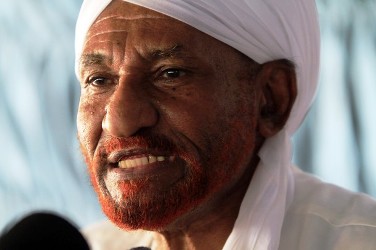Al-Mahdi says NUP did not support protests due to lack of clear NCP alternative
October 18, 2013 (KHARTOUM) – The head of Sudan’s largest opposition party directed fresh criticism at the ruling National Congress Party (NCP) accusing it of damaging the economy and prioritizing security expenditures over more pressing items just to maintain its grip on power.

However, the opposition leader suggested that his party is not prepared to support any uprising against the government until political and social groups in the country agree to a clear alternative.
Al-Mahdi recalled the demonstrations that erupted since late September across Sudan against the government’s decision to cut fuel subsidies saying that his party did not call on its membership to join them.
“The reason for not inviting the [NUP] youths to protest is for the lack of suitable alternative and we previously tabled the question of who is the alternative and did not find it,” al-Mahdi told a gathering on Friday night held under the title of ‘Call for National Consensus’.
The meeting was called for by several group including ‘Youths for Change’ to establish a united front that would also incorporate the NCP and opposition parties to lead internal and external reforms and resist the International Criminal Court (ICC) indictment of president Omer Hassan al-Bashir.
However, most opposition parties and even the NCP boycotted the meeting.
According to the al-Khartoum daily, al-Mahdi went on to explain that protests and acts of civil disobedience require preparations so the NUP could not urge people to protest without giving them the necessary support.
The NUP leader stressed that excluding the NCP from political transition will lead to a scenario similar to that of Syria and Egypt.
He also criticized what he described as the “internationalization” of Sudan problems saying that the 2005 Comprehensive Peace Agreement (CPA) and Abyei protocol were “cooked” by the United States.
The NUP agreed with other participants that they are to address the United Nations Security Council (UNSC) to scrap Bahir’s warrant on the grounds that he is the symbol of the nation.
This is not the first time al-Mahdi pours cold shower on opposition stated intentions to topple the regime and took stances that were interpreted to be pro-government.
Many critics point out to the fact that al-Mahdi’s son Abdel-Rahman has accepted a position as an assistant to president Bashir in late 2011.
The NUP leader has made sure to distance his party from last year’s demonstrations that broke out in response to the government’s rollout of austerity measures in response to growing economic pressures caused by the secession of the oil-rich South Sudan.
“We have hosted them [the protesters in our headquarters] but we don’t think that the time has come for us to organise such a movement until we have an alternative regime in place … and democratic transformation”, al-Mahdi, told the Financial Times newspaper in July 2012.
Some members of the NUP politburo privately say that they believe al-Mahdi has forged a secret deal with the NCP to assure that the opposition party stays away from any attempts to stage mass protests against the regime.
Last June, al-Mahdi said he does not approve of the 100-day plan to oust the regime announced by the National Consensus Front (NCF) even though a representative of the NUP at the coalition said he took part in formulating the scheme.
Instead, he offered a different initiative to change the regime through collecting a million signatures and organizing sit-ins in public squares and other places.
(ST)
